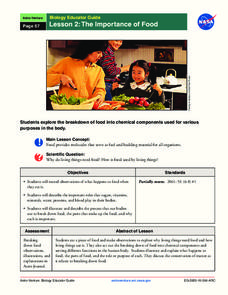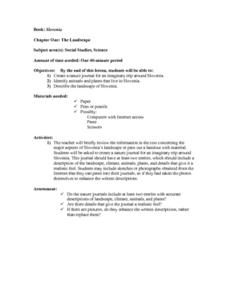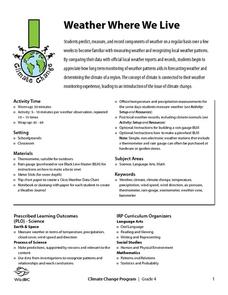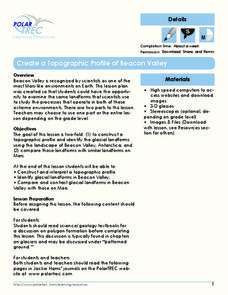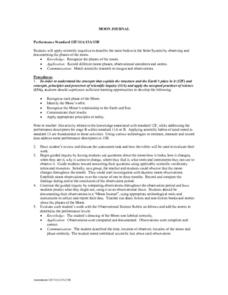Captain Planet Foundation
Shape Shifters in the Math Garden
Combines mathematical measurement with gardening skills. Third graders hunt for worms in the garden and try to find the longest one. They also measure and weigh vegetables that they harvest from the garden, measure rainfall amounts,...
NASA
The Importance of Food
Pupils make observations while eating food. They act out the process of food breaking down in the body and the roles of various chemical components, such as sugar and protein. It concludes with an activity illustrating the process and a...
Curated OER
Distance Makes a Difference
Learners create a clay model of the Sun and Earth. In this space science lesson, students explain how distance affects the appearance of objects. They write a poem or riddle about the Sun in their journal.
Curated OER
Understanding Science Fiction
Fourth graders learn about the genre of science fiction. In this science fiction lesson, 4th graders learn about the characteristics of science fiction as a genre. They write an original piece of science fiction.
Curated OER
Simple Rocket Science
Young scholars demonstrate Newton's Third Law of Motion. They discuss the history of rockets, observe how a rocket works, and draw a picture and write an explanation of the balloon experiment.
Curated OER
Slovenia: The Landscape
Students imagine they are taking a trip around Slovenia. They create a nature journal for their trip including the description of the landscape, climate, animals and plants. They are to give details to make it seem real. Students may use...
Curated OER
Plaster Sculpture – subtractive method
Practice the subtractive sculpture process with your class. They'll discuss the subtractive method, art form and space, then design a sculpture which they will create from a block of plaster. Technical instructions are included.
Curated OER
Sensing Energy: Designing to Stay Cool
Students examine the energy the sun produces on a daily basis. In groups, they discover the properties of visible and invisible light. They also adjust the exposure time to change the properties of various objects. To end the lesson,...
Curated OER
ENTICEing Fun with Illinois Facts
Young scholars participate in a multi-grade scavenger hunt. Using fun-fact cards, they answer questions based on Illinois. They record their answers in a journal and discuss any items they are unclear on.
Curated OER
Solids, Liquids, and Gases
Students explore the three main forms of matter: solid, liquid, and gas. They examine concrete examples of each, using their five senses and "experimenting" to find differences in them. They find pictures of each, cut them out and past...
Curated OER
Space Science:Wherever You Go, There You Are
Students explore navigation principles by observing, measuring, and interpreting data to determine locations. Using a compass, compass rose, and a transit, they plot courses and discover the workings of the Global Positioning System...
Chicago Botanic Garden
Nature Walk and Ecosystem Introduction
A food web has no organism higher than a tertiary consumer because there wouldn't be enough energy left to sustain them. The fourth installment in a seven-part series begins with a nature walk to get pupils thinking about their...
Wild BC
Weather Where We Live
Over a span of two weeks or more, mini meteorologists record weather-related measurements. What makes this particular resource different from others covering similar activities are the thorough details for the teacher and printables for...
Space Race
Sensory Detectives
Test your learners' sensory awareness with three hands-on activities that ask pupils to use their other senses to identify and describe everyday objects hidden from sight.
Polar Trec
Create a Topographic Profile of Beacon Valley
Landforms in Beacon Valley, Antarctica, where there is no snow, bear a striking resemblance to landforms found on Mars. Scholars identify landforms found in Beacon Valley through analysis of topographic maps in the activity. They then...
Curated OER
Just a "Fellow Traveler" in the Human Experience
Students connect the events of early space exploration to their lives today. After viewing a teacher created gallery, they discuss how the launch of Sputnik and how space exploration in general has positively or negatively affected...
Curated OER
Guided Reading "In the Night Sky"
Students participate in a variety of reading exercises, such as choral reading and reading response journal, to reinforce concepts about space and nocturnal animals.
Curated OER
You Are Here
Students determine the relative size and distance of the planets in the solar system. They use ratios in their mathematical calculations to make models of the planets after discussing the relative sizes of the planets. They keep a...
Curated OER
Basic Needs of Plants
Second graders conduct a plant experiment. In this basic needs of plants activity, 2nd graders observe plants for two weeks. Students record data from their plants in journals.
Curated OER
Is Anyone Out There? Examining Astrobiology and the Value of SETI
Blow their minds with a lesson on the search for life outside of our planet! A brief video proposes the question of how to define life. A couple of articles investigate the possibility of alien existence. Finally, the class is divided...
Curated OER
Moon Journal
Fourth graders observe Moon and its features, and record results both in written form and in a drawing on the given template.
Curated OER
The Science of Glaciers
Students identify the contents of a glacier like those found in Patagonia. They construct a mini glacier model in class. Students compare and contrast the classroom model with Patagonian glaciers. They label specific parts of the...
Curated OER
Science: Liquid Matter
Second graders examine the properties of liquids and their classifications. They compare and contrast cups of different liquids and record their findings in journals. Students observe how liquids flow at various speeds and that unlike...
Curated OER
Science: The Changing Life of Air Pressure
Fourth graders observe demonstrations how heated air rises and becomes a low pressure area. After watching several teacher-conducted experiments, 4th graders, in groups, discuss and answer questions in their journals. Finally, they...

